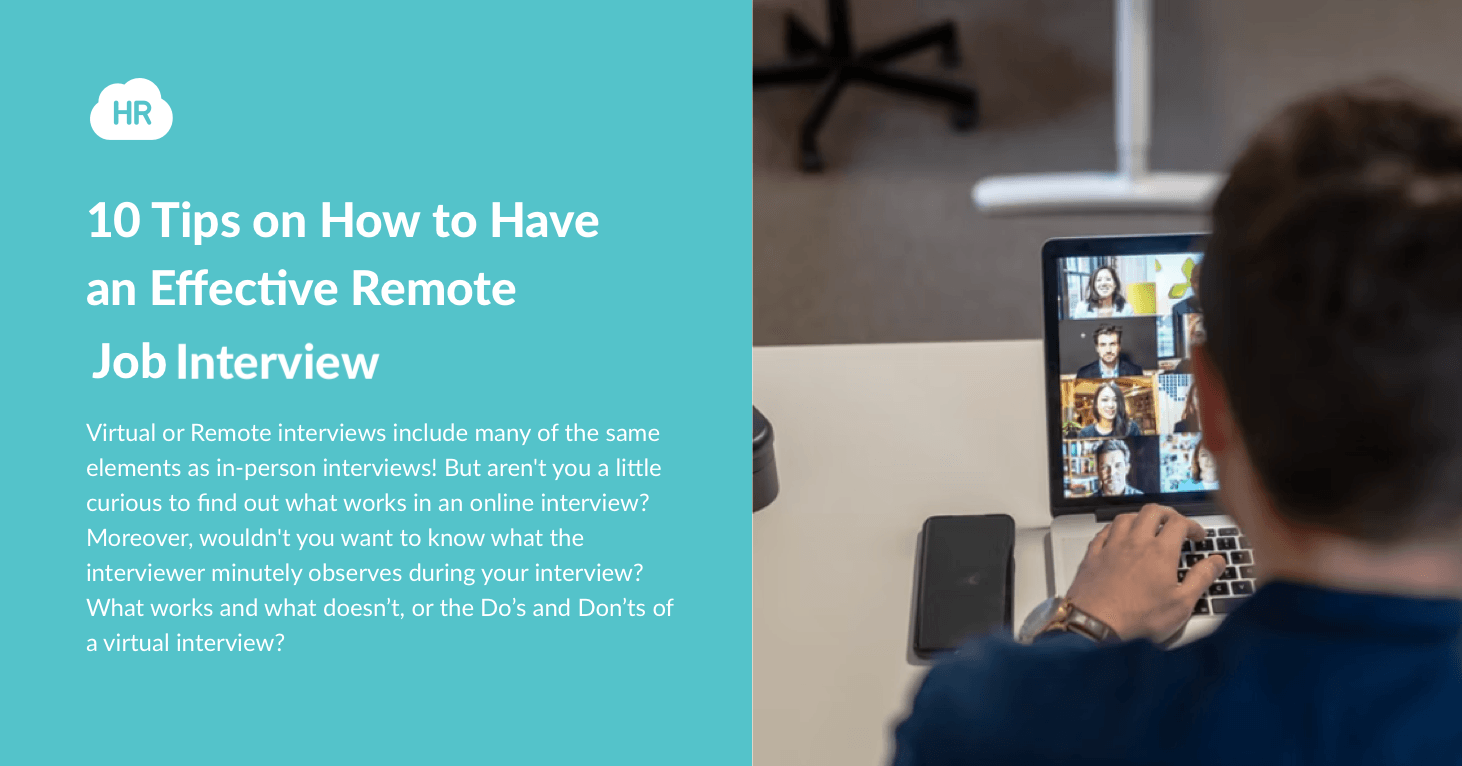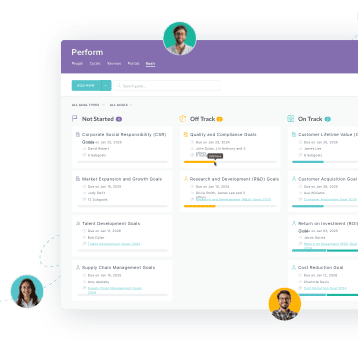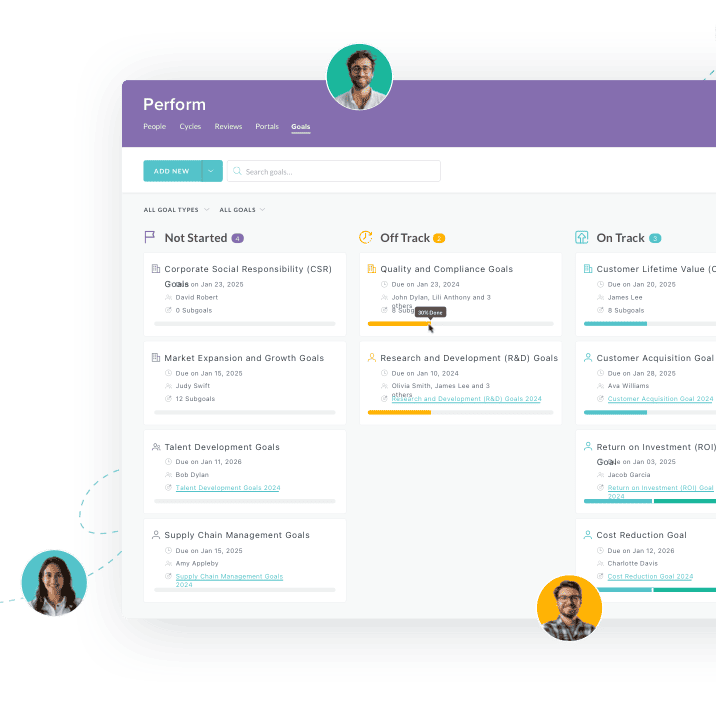10 Tips on How to Have an Effective Remote Job Interview

- Have a Back-Story to Tell
- Ascertain That You Have a Fast and Stable Internet Connection
- Don't Reply to Every Email Right Away
- Make Use of a High-Resolution Webcam and Microphone
- As Far As Your Dressing is Concerned
- Make a List and Double-Check It
- suggest More than One Online Platform You're Comfortable with
- Pay Keen Attention to Front-facing Light
- Make Use of the Humble-Brag Technique
- Perform a Trial Run Without Fail
- Bonus: Prepare Yourself for the Questions They May Ask


 Cut onboarding time
by 60%—here's the
Ultimate Checklist
that helped do it.
Cut onboarding time
by 60%—here's the
Ultimate Checklist
that helped do it.

Virtual or Remote interviews include many of the same elements as in-person interviews! But aren't you a little curious to find out what works in an online interview? Moreover, wouldn't you want to know what the interviewer minutely observes during your interview? What works and what doesn't, or the Do's and Don'ts of a virtual interview?
Instead of handshakes and finding out which chair in the conference room to sit in, you'll click a link and join a video call in a remote interview. Of course, there will be less stress than traditional in-office interviews, but one is expected to maintain the decorum of a formal interview. As more companies adopt a hybrid work model and manage remote teams, mastering the art of virtual interviews is crucial for both employers and potential remote employees.
If you are lined up for a virtual interview, read ahead to find ways to shine through it and overcome common remote work challenges.
1. Have a Back-Story to Tell
During an interview, virtual or real, the value of a good tale and the abilities required to tell one is critical. This is one of the attributes that will make it crystal evident that you're the best candidate for selling your future employer's items and contributing to the remote team culture.
Again, having something prepared will serve you well; a humorous business interaction or a specific problem you assisted in solving are excellent examples of how to show your conversational agility indirectly (and explicitly). These stories can also demonstrate your ability to engage remote employees and contribute to effective employee retention.
2. Ascertain That You Have a Fast and Stable Internet Connection
Everyone craves a lucrative alternative when it comes to a job. Imagine attending a virtual interview for the best-paying job or your dream job. How would you feel when the interviewer gets annoyed about multiple call disconnects or poor connection?
Do you still think you would be able to make a good impression when the other side jurors cannot comprehend what you say? You risk having unclear audio on the call if you have a bad connection, which is a deal-breaker. You're toast no matter how well you prepared for the call. If your interviewers can't hear you or your video freezes, you're toast.
It is important that you ensure the stability of your internet connection during the job interview. If needed, keep a spare hotspot ready for immediate reconnection if your existing connection does not work properly. Sites like Speedtest are useful for monitoring your bandwidth if you're wondering about your internet speed. It is reasonable to remove any other apps decelerating your computer or eating up data before your interview. This preparation is crucial for successful remote team collaboration and virtual team meetings.


3. Don't Reply to Every Email Right Away
According to successful remote employees, finding a work-life balance is essential for happiness and long-term success in a remote work environment. When a team expresses interest in you as a candidate, don't feel obligated to respond to every email immediately, especially if it occurs after hours.
The situation determines the speed at which you respond. Wait until the morning to respond to a non-urgent email that arrives at 9:45 p.m. However, if you receive an email late at night about scheduling an interview the next day and time is of the essence, everyone will appreciate it if you react as soon as possible.
When you respond to emails promptly but not compulsively late at night, you demonstrate that you recognize the importance of work-life balance. That's a quality that employers should look for in remote workers, as it contributes to effective remote employee engagement and retention.
4. Make Use of a High-Resolution Webcam and Microphone
Consider how it would feel if you were unable to speak for the entirety of the interview. That'd be a catastrophe!
Poor-quality microphones or cameras could ruin your remote job interview! If you don't want a camera or a microphone to hinder your chances for the job, make sure they're set up correctly ahead of time.
Alternatively, you can use other professional services for superior audio and video. Live streaming services and streaming video providers take care of the technical aspects of broadcasting.
A bad webcam may indicate that you are not interested in being recruited! To ensure smooth communication continuity, interviewers want to see and hear you. This is especially important for remote teams and distributed teams who rely heavily on virtual communication.
5. As Far As Your Dressing is Concerned
Your attire is not formal, but it should be professional and camera-friendly. (And while we're on the subject of cameras, keep in mind that the quality of your camera, lighting, and background have a huge impact on how you appear on screen, so make sure you have the correct gear, even if you have to borrow it from a friend.)
Choose Your Shirt/Top with Care
The apparel that can be seen on the screen is crucial, so make sure your top half isn't too casual. Wear a shirt that isn't simply any old shirt. Aim for something unremarkable—boring is preferable to shouting.
Keep your outfit simple, neutral, and professional if you want an interviewer to focus on you rather than what you're wearing. An excellent alternative is a traditional button-down shirt or blouse. Bright hues, dark colors, and busy prints should be avoided. Wearing white, light blue, light grey, or another light hue is the safest option, as long as the color doesn't blend into your surroundings—for example, don't wear white if there's a white wall in the background.
Do Not Pair Blazer with a T-shirt
Because determining what is professional and informal is subjective, investigate the culture of the firm you're interviewing with to get a sense of what to wear. The majority of company websites feature images of the workplace and on-site events. They can give you a fair idea of how the majority of the people there dress, but it's best to dress up a notch.
Even if most of the males in the photographs aren't wearing jackets, you could want to go for the formal look. Wear a collared shirt with your blazer if you choose to wear one for your video interview.
While a t-shirt and blazer can look decent together, it is not recommended for a job interview. When you need an extra layer over a shirt or blouse, a cardigan might do the task of making you look prepared and professional.
6. Make a List and Double-Check It
Do you have trouble recalling past jobs and their recommendations? The best option is to make a list. Compared to an in-person interview, keeping written and easy-to-access records of all of these things can make your virtual interview a lot easier and more comfortable.
You might have a list of questions you want to ask your company. Your queries might be related to the payroll, how they started their Shopify store if it's a small business, or it might be related to your leave. Whatever it might be - just prepare a list and keep a list nearby.
The simplest missteps in the interviewing process frequently result in the biggest failures. You can create a list of things you want to keep handy during the interview. These can be details about your past job description, achievements, a list of challenges, or the list of expectations from the new role. This preparation is crucial for demonstrating your readiness to tackle remote work challenges and contribute to the remote work strategy.
7. Suggest More Than One Online Platform You're Comfortable With
When a potential employer inquires about your availability for an interview, offer several options. You can even request to schedule an interview on Instagram. Using Skype, Google Meet, Zoom, etc., are other viable alternatives that you may use for the online interview.
Although the team may already have a favored way, providing multiple options demonstrates that you are proactive in facilitating communication. Again, remote workers are aware of this and will be aware of it. This flexibility is key in remote team management and fostering effective remote team collaboration.
8. Pay Keen Attention to Front-facing Light
If you want to look your best on a video call, keep your light source in front of you. While it may be tempting to flaunt your wide window vista, backlighting your face will result in shadows – and a strange interview experience!
Because you're unlikely to have ring lights or other expensive lighting equipment on hand, face a window to make use of ample natural light. Place a table lamp about a foot or so in front of you and begin the video connection without a window. Proper lighting is crucial for creating a professional remote work environment during virtual team meetings.
9. Make Use of the Humble-Brag Technique
Bragging modestly about any of your achievements will demonstrate that you understand why you're there.
Indicate that you believe you have the best sales abilities for this job (without being arrogant), and your interviewer will be more confident in awarding your high scores. Your interviewer will believe in your abilities if you do. This technique can be particularly effective in showcasing your potential for remote employee performance and your ability to contribute to the remote work culture.
Bonus for Communication: Establish a Good Rapport
In any commercial interaction, establishing rapport is critical because it allows you to distinguish yourself from other applicants by forging a personal connection with the interviewer. When you have a face-to-face interview, your enthusiasm, body language, handshake, and early small chat all assist you in establishing a rapport with your future employer.
It's still vital to develop strategies to establish rapport when conversing virtually. You can do this by being prepared to discuss a mutual interest, inquiring about your interviewer's virtual interview experience, or finding another neutral topic to learn more about your interviewer. Building rapport is crucial for remote employee engagement and can contribute to successful remote team building.
10. Perform a Trial Run Without Fail
You don't want the technology that allows you to work at a remote company to throw you off on the day of your interview! Practice making the technology unnoticeable to both you and the interviewer. It doesn't have to be a professional tie to practice with someone.
If you're having trouble finding someone to practice with, take advantage of the opportunity to reconnect with a friend or family member you haven't spoken to within a while. If you're not used to video chats, this is a great way to get a taste of the richer connection that comes with seeing each other's emotions on camera in real-time. This practice can also help you prepare for future virtual team meetings and remote onboarding processes.
What'll Your Work Be Like?
Remote work differs from regular office employment in the following ways:
-
A video hangout is replacing the conference room
-
The closed-door is being replaced by an "away" message
-
A digital chat is replacing the fast talk
-
Your fluorescent lights are being replaced by...well, any lighting you like
However, you give up some of your freedom in exchange for more responsibilities. It's up to YOU to get your work done without your boss passing by or the office manager checking your timesheet. That means you must be an expert at time management, task prioritization, and communicating with your supervisor and coworkers. These skills are essential for managing remote workers and contributing to a successful remote work strategy.
Bonus: Prepare Yourself for the Questions They May Ask
What does "Working Remotely" imply to you?
Many people choose remote employment because it allows them to be more flexible. You can work from any location and at any time.
Your boss would want to know if you'll be working from your house, any cafe, or even a hotel if you'll be traveling. It's crucial since it decides how well you'll fit in with the group. Do you spend time with your children between the ages of 3 and 5 every day? Alternatively, perhaps you work from home and are available "on-call" during the day. Understanding your approach to remote work helps employers assess your fit with their remote work policy and culture.
Would you please describe your favorite and least favorite jobs?
This is likely to be one of the work-from-home interview questions you'll be asked. An interviewer may not consider you a good fit for remote work if your favorite job involved group outings and frequent team lunches or if your least favorite job was when you felt trapped behind a desk.
If that's your honest answer, frame it in a way that demonstrates how remote work won't prevent you from engaging with others and how your passion for working with people qualifies you for this remote position. This question helps assess your potential for remote employee engagement and your ability to thrive in a remote team culture.
How do you manage your schedule and calendar? What applications do you use?
You might also get more specific queries, such as:
-
What's on your to-do list?
-
Do you set aside time to do specific types of work?
-
Do you keep a public calendar that everyone can see?
In a remote job, believe it or not, the practicalities of managing your work-life are critical. In addition, asking this question will disclose whether or not a candidate has given much thought to the organization, which is essential in a distant life. Your answer can demonstrate your readiness for remote team management and your ability to contribute to effective employee retention in a remote setting.
When working from home, how do would you limit distractions?
There are times when working from home might be difficult, and companies that provide remote positions recognize this. If a friend calls for a conversation, the sink is full of dirty dishes, or the kids are home from school, talk about what you do to keep yourself from getting distracted.
If you've never worked remotely before, describe how you've dealt with distractions in the workplace. Interviewers can get a sense of how you handle distractions while working from home by hearing about how you deal with them in the workplace. This question helps assess your ability to maintain productivity in a remote work environment and contribute to the overall remote work culture.
Finally - A Courtesy Email
If you're going to write an email to the individual who interviewed you or the team, make use of an email finder tool to find accurate email addresses and thank them for their time and make a good impression. Reiterate your enthusiasm for the team and the opportunity at this time! This follow-up can be a great start to your remote onboarding process if you're selected.
Shining through an online interview is more than just technical preparation. The interviewer observes numerous things to make the final selection. The above tips aim to offer clear insight into how you should prepare yourself for the virtual interview, whether you're joining a fully remote team or a company embracing a hybrid work model.
 Discover how our HR solutions streamline onboarding, boost employee engagement, and simplify HR management
Discover how our HR solutions streamline onboarding, boost employee engagement, and simplify HR management
Author Bio:
Surrinder is a content writer with a passion for writing for the marketing, HR, and business domain. He has an experience of more than 6 years in the writing domain and aims to provide high-quality content.
Keep Reading
Caregiver Turnover in Home-Based Care: 5 Fixes That Actually Work
Home healthcare agencies face alarming turnover rates of 75%, with most caregivers
10 Workforce Management Issues Hospitals and Home Care Teams Face (and What Fixes Them Fast)
"We're hemorrhaging nurses faster than we can replace them, and our current systems can't
Understand The Employment Contracts: Key Legal Considerations for HR
One of the hallmarks of any successful business is a clear understanding of the
Like What You Hear?
We'd love to chat with you more about how HR Cloud® can support your business's HR needs. Book Your Free Demo

Build a Culture of Recognition. Boost Engagement. Guaranteed.
Workmates empowers employees to stay informed, connected, and appreciated—whether they’re on the front line, in the office, or remote. Recognition drives 12x higher engagement.Trusted by industry leaders in every sector




Cut Onboarding Costs by 60%.
Take the confusion and follow-ups out of onboarding with automated workflows, digital forms, and structured portals—so new hires ramp faster 3X quicker.Trusted by industry leaders in every sector




